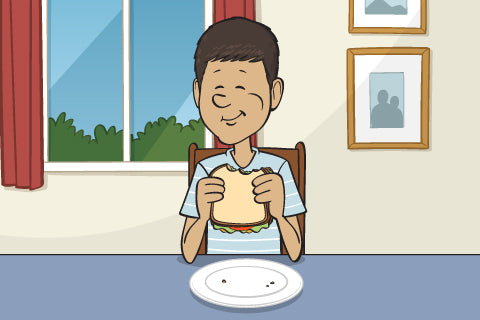Chew on This
Blog · Sep 25, 2023

Modern life demands urgency in everything we do, or so it seems.
The digital age has fostered an ultra-advertising age. Common advertising slogans and social media influencing inundate us practically every second of every day with this “Go, go, go!” mentality to “Act fast,” and “Don’t delay,” because, “supplies are running out,” and “time is running out,” and “you’re missing out,” or some other urgent call to action.
These days, every message hurled at us is designed to get us to act before we think about what we really want or need. Not only are we reminded to buy everything we can get our hands on, we’re usually told we need to do it right away. It’s a wonder what we did in the past without all this fantastic, fleeting stuff.
Marketers likely fear that, given a chance to think about what we are doing, we might do something else. They are right to fear that.
The marketing of food is no exception.
Have you ever felt a sudden urge for pizza or fried chicken or some other savory quick delight sometime around 5pm? It couldn’t possibly be the back to back advertisements from food outlets peddling their wares with some seductive music and warm lighting and a little sizzle, right? From fast food restaurants to ultra-processed foods offered at the local convenience store, we are urged to get out and start eating. By then of course, we rush through our meals without thinking about much other than our hunger pangs.
We are also often encouraged to gear up for dinner before we’ve even had a chance to digest lunch. This accelerated pace of eating doesn’t leave much time for us to consider the nutrients (or lack thereof) our food choices provide (or fail to provide) for the organs in the body.
Slow Down. Chew Your Food.
It’s true. Eating slowly supports eating less, but it also improves digestion and helps the organs in the body absorb the nutrients in the food. Plus, eating slowly increases food enjoyment.
Paying attention to chewing each bite fosters a calm, relaxed attitude during the meal. Taking a sip of water between bites regulates the pacing of our meals as well.
It’s recommended that we count how many times we chew our food and then double it. It turns out that many of us don’t chew our food nearly enough. During each meal, try putting the fork down between bites to slow down the pace of eating.
Chewing food purposefully allows the digestive system to absorb their nutrients more effectively. Taking smaller bites encourages additional chewing. It feels counterintuitive, but the larger the portion on the fork, the less we tend to chew.
Eating whole foods that also require chewing like nuts, and meats, and fruits and vegetables like carrots, broccoli, apples, and oranges leads to fuller meal satisfaction and improved digestion. Plus, chewing denser foods strengthens the jaw muscles.
Time Keeps on Slipping
The hard part comes when you really don’t have time. A real urgency comes with all our obligations. Work, school, family, afterschool sports. These are priorities that take time and travel. How do we meet those needs and take care of our bodies too?
As opposed to focusing on just assuaging hunger or eating whatever is most conveniently available, taking a broader view in our relationship to food fills more than our bellies. When we slow down and enjoy eating for what it is supposed to do for us, to provide both nourishment and joy, we’re more likely to choose nutrient-dense foods loaded with nourishing benefits for all the organs of our bodies.
Making food choices based on urgency or convenience is not a winning strategy in the long run because it’s not just about eating in the moment, it’s about eating for life.
Eat with purpose and chew with patience. It does a body good.